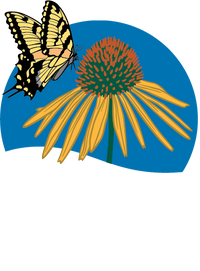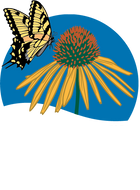





Coreopsis pubescens 'Sunshine Superman' - star tickseed

![]()


![]()
DESCRIPTION
star tickseed
Coreopsis pubescens 'Sunshine Superman'
This powerhouse bloomer flowers from early summer into October covering its soft green foliage and rounded, spreading form with masses of yellow-orange color. Neither heat or mildew seems to phase this performer that loves to be grouped and always has a flock of butterflies nearby.
BENEFITS
- Butterflies are drawn by its nectar
- Small birds like finches love to eat its seeds
- Drought tolerant once established
- Loves to be grouped in sunny gardens
- Deer resistant
NATIVE INFO
Native Range

Native range derived from The Biota of North America
INTERESTING FACTS
Butterflies use their tarsi or "feet" as taste receptors. When they contact sweet liquids such as nectar butterflies extend their proboscis to eat the nectar sensed by the taste receptors.
GROWING TIPS
Grow in full sun or part shade and average to dry soil. Very tolerant of a wide variety of conditions and quite drought tolerant once established. Cut back spent flowers for more prolific reblooming. Plants are somewhat short-lived and self-seeding helps perpetuate a good planting in the garden. Plants may be cut back hard in summer if foliage sprawls or becomes unkempt.
Mature Size: 12-18in. Tall x 12-18in. Wide
Hardiness Zone: 5-9
Sun Exposure: Full Sun to Part Shade
VIDEO
Coming Soon!
American Beauties Offer Solution Based Plant Collections to Help you Choose
Quick Tips for Choosing Plants:
- Planting a variety of native trees, shrubs, perennials and vines increases biodiversity and gives wildlife a source for food, cover and nesting
- Choose a mixture of deciduous and evergreen trees so birds and other wildlife will always be able to find shelter
- Plant trees and large shrubs where they will block winter winds from the house and shade it in summer, that will save energy and lower your carbon footprint
- Try your best to buy plants that were grown locally, your independent garden center will be your best bet
- Think about ultimate height and width of the plant you choose, make sure it will fit the space you have for it when it's reached maturity
- Plant nectar plants in groups, to attract butterflies and other beneficial insects more easily
- Ask for help if you need it. Most garden centers either have a landscape designer on staff or they can give you a reference of a designer that is adept at native plant wildlife gardening. There will be upfront costs but they are small when compared to having to redo a landscape that wasn't what you really wanted
Our Plant Tags Hold the Secrets to Success
Choosing the right plants for your garden can seem like a daunting task but we’re here to help. Our horticulturists have spent a considerable amount of time researching and writing our beautiful, American Beauties plant tags to help you be successful. First of all, when you see an American Beauties branded pot at your garden center you can be confident that the plant is native to your area and a responsible choice.
When you look at our tag you’ll find information about the plants natural habitat. That will give you a clue to how it will work in your backyard. For instance if the plant is naturally founded and moist, shade and you have full sun, it’s not the plant for you. The “Features” section gives you an overview or plant description so you’ll know what to expect. While the “Benefits” section talks about the plants strong suits and how the plant will benefit wildlife.
A Special Note About Exposure
Full sun: Prefers six or more hours of direct sunshine a day
Partial shade: Thrives in three to six hours of daily sunshine
Shade: Generally does well with less than three hours of sun per day. Having said that even shade loving plants will struggle in extremely deep shade.
DOWNLOADABLE RESOURCES
Best Plants for Bees - Double sided printout for download
Best Plants for Butterflies - Double sided printout for download



